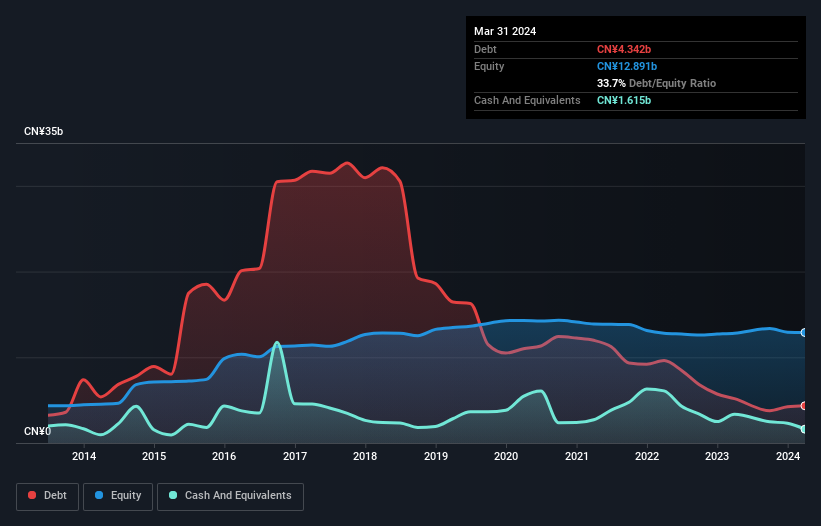
David Iben put it well when he said, 'Volatility is not a risk we care about. What we care about is avoiding the permanent loss of capital.' When we think about how risky a company is, we always like to look at its use of debt, since debt overload can lead to ruin. We note that Greattown Holdings Ltd. (SHSE:600094) does have debt on its balance sheet. But should shareholders be worried about its use of debt?
Why Does Debt Bring Risk?
Debt and other liabilities become risky for a business when it cannot easily fulfill those obligations, either with free cash flow or by raising capital at an attractive price. Part and parcel of capitalism is the process of 'creative destruction' where failed businesses are mercilessly liquidated by their bankers. While that is not too common, we often do see indebted companies permanently diluting shareholders because lenders force them to raise capital at a distressed price. Having said that, the most common situation is where a company manages its debt reasonably well - and to its own advantage. The first step when considering a company's debt levels is to consider its cash and debt together.
See our latest analysis for Greattown Holdings
How Much Debt Does Greattown Holdings Carry?
The image below, which you can click on for greater detail, shows that Greattown Holdings had debt of CN¥4.34b at the end of March 2024, a reduction from CN¥5.18b over a year. However, it also had CN¥1.61b in cash, and so its net debt is CN¥2.73b.

A Look At Greattown Holdings' Liabilities
According to the last reported balance sheet, Greattown Holdings had liabilities of CN¥10.4b due within 12 months, and liabilities of CN¥1.40b due beyond 12 months. Offsetting this, it had CN¥1.61b in cash and CN¥422.6m in receivables that were due within 12 months. So its liabilities outweigh the sum of its cash and (near-term) receivables by CN¥9.77b.
When you consider that this deficiency exceeds the company's CN¥8.41b market capitalization, you might well be inclined to review the balance sheet intently. Hypothetically, extremely heavy dilution would be required if the company were forced to pay down its liabilities by raising capital at the current share price.
In order to size up a company's debt relative to its earnings, we calculate its net debt divided by its earnings before interest, tax, depreciation, and amortization (EBITDA) and its earnings before interest and tax (EBIT) divided by its interest expense (its interest cover). This way, we consider both the absolute quantum of the debt, as well as the interest rates paid on it.
With net debt to EBITDA of 2.9 Greattown Holdings has a fairly noticeable amount of debt. On the plus side, its EBIT was 9.9 times its interest expense, and its net debt to EBITDA, was quite high, at 2.9. If Greattown Holdings can keep growing EBIT at last year's rate of 10% over the last year, then it will find its debt load easier to manage. There's no doubt that we learn most about debt from the balance sheet. But you can't view debt in total isolation; since Greattown Holdings will need earnings to service that debt. So if you're keen to discover more about its earnings, it might be worth checking out this graph of its long term earnings trend.
But our final consideration is also important, because a company cannot pay debt with paper profits; it needs cold hard cash. So we always check how much of that EBIT is translated into free cash flow. Happily for any shareholders, Greattown Holdings actually produced more free cash flow than EBIT over the last two years. That sort of strong cash conversion gets us as excited as the crowd when the beat drops at a Daft Punk concert.
Our View
When it comes to the balance sheet, the standout positive for Greattown Holdings was the fact that it seems able to convert EBIT to free cash flow confidently. However, our other observations weren't so heartening. In particular, level of total liabilities gives us cold feet. Looking at all this data makes us feel a little cautious about Greattown Holdings's debt levels. While debt does have its upside in higher potential returns, we think shareholders should definitely consider how debt levels might make the stock more risky. When analysing debt levels, the balance sheet is the obvious place to start. But ultimately, every company can contain risks that exist outside of the balance sheet. To that end, you should learn about the 3 warning signs we've spotted with Greattown Holdings (including 1 which doesn't sit too well with us) .
Of course, if you're the type of investor who prefers buying stocks without the burden of debt, then don't hesitate to discover our exclusive list of net cash growth stocks, today.
New: Manage All Your Stock Portfolios in One Place
We've created the ultimate portfolio companion for stock investors, and it's free.
• Connect an unlimited number of Portfolios and see your total in one currency
• Be alerted to new Warning Signs or Risks via email or mobile
• Track the Fair Value of your stocks
Have feedback on this article? Concerned about the content? Get in touch with us directly. Alternatively, email editorial-team (at) simplywallst.com.
This article by Simply Wall St is general in nature. We provide commentary based on historical data and analyst forecasts only using an unbiased methodology and our articles are not intended to be financial advice. It does not constitute a recommendation to buy or sell any stock, and does not take account of your objectives, or your financial situation. We aim to bring you long-term focused analysis driven by fundamental data. Note that our analysis may not factor in the latest price-sensitive company announcements or qualitative material. Simply Wall St has no position in any stocks mentioned.
About SHSE:600094
Greattown Holdings
Engages in the real estate development business in China.
Excellent balance sheet average dividend payer.


